
Latest News Regarding
Horn of Africa
What’s Driving Sudan and Ethiopia Apart?
What’s Driving Sudan and Ethiopia Apart?
Source: The International Crisis Group posted on 18 May 2021 a 30 minute podcast titled “What’s Driving Sudan and Ethiopia Apart?” with Annette Weber, senior fellow with the German Institute for International and Security Affairs.
Weber talks about Sudan’s and Ethiopia’s diverging views on their border dispute, the ongoing disagreements over the Grand Ethiopian Renaissance Dam, and the worrying rise of militias in both countries. She also discusses the future of Ethiopia’s recent alliance with Eritrea and the unclear fate of regional multilateralism. Finally, she looks at the EU’s new strategy towards the region and how US reengagement might affect the European approach. 0 commentsLabels: Abdalla Hamdok, Abiy Ahmed, Amhara militia, AU, border conflict, diplomacy, Egypt, elections, Eritrea, Eritrean Defense Forces, Ethiopia, EU, GERD, IGAD, Isaias Afwerki, refugees, Sudan, Tigray Region, US
Trailblazing female marine pilot beats the tide in Djibouti
Trailblazing female marine pilot beats the tide in Djibouti




Source: Hiiraan Online, Tuesday May 18, 2021
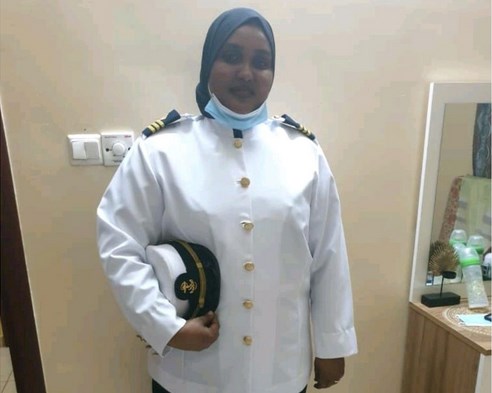
DJIBOUTI (HOL) – Sea transport has for many years been a reserve of men with few women getting the opportunity, especially in most African countries. But for Fatouma Ali Ahmed, women can equally steer ships just as men can do.
Fatouma is the first female marine pilot in the port of Djibouti and currently heads the Pilotage Department in the same port. According to her testimony posted on LinkedIn, Fatouma, a mother of 3-year-old twins joined the marine industry in 2012.
But she had to study English for six months first before starting her formal training as a marine pilot. Despite concluding her studies, Fatouma still needed a practical experience at sea but could not get the chance in her country or neighbouring Ethiopia.
“As a female in the Maritime Industry one of my greatest challenges has been trying to get sea time,” Fatouma said. “All my male classmates that I attended class with were already at sea doing their sea time with the Ethiopian shipping company and at the time the company was not accepting woman onboard their ships.”
Her chance would finally come when the Djibouti port authority got her a chance at P&O Maritime in Australia, ‘where I was able to complete my sea time.’
Fatouma attributes her success to ‘progressive parents who believed in educating their daughter’. She adds that she is married to a marine engineer ‘who is a great support system since he understands the industry.’
Against the Tide Foundation is a LinkeIn platform that shares stories of female seafarers across the globe
Somaliland marks 30 years of self-rule
Somaliland marks 30 years of self-rule




Source: Hiiraan Online, Tuesday May 18, 2021
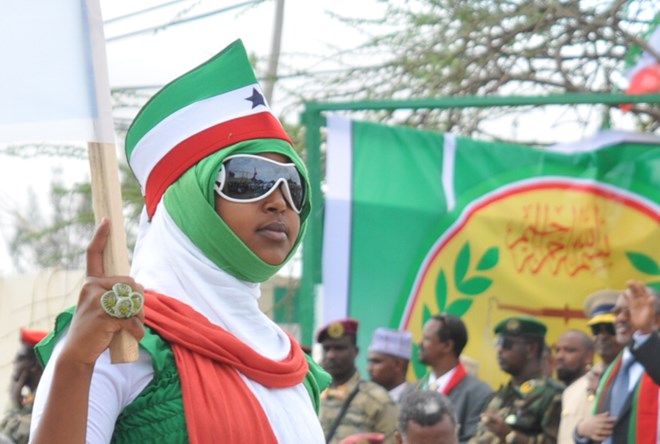
Hargeisa (HOL) – The self-declared republic of Somaliland celebrates 30 years of independence from Somalia on Tuesday, as officials make preparations for festivities in Hargeisa and other cities.
Hargeisa residents began celebrating as early as 2 AM in the city centre.Thousands of people are expected to gather at Independence Square on Tuesday afternoon to commemorate the milestone with live music and other events.
While not formally recognized as a sovereign state, Somaliland has been lobbying for international support. It hosts at least a half dozen diplomatic offices in Hargeisa. Somaliland also maintains liaison offices worldwide, although they do not have formal diplomatic status under the Vienna Convention.
International observers have noted that Somaliland contains all the trappings of a contemporary nation-state, with its own parliament, currency, defence and national identity. Most of Somaliland’s residents were born post-independence.
Somaliland was a former British protectorate and briefly gained independence on June 26, 1960, before merging with Italian Somaliland to form the Somali Republic on July 1, 1960.
Its five days of independence were recognized by 35 countries and the international community, including the US and UN.
Following the overthrow of Somalia’s military ruler Siad Barre in 1991, Somaliland unilaterally declared independence from Somalia on May 18 of the same year within the borders of the former British Somaliland.
State Department Summary of U.S. Special Envoy Trip to Horn of Africa
State Department Summary of U.S. Special Envoy Trip to Horn of Africa
Source: The Department of State released on 14 May 2021 a statement titled “Travel by U.S. Special Envoy for the Horn of Africa Jeffrey Feltman.”
Special Envoy for the Horn of Africa Jeffrey Feltman has just completed his first visit to the region, traveling to Egypt, Eritrea, Sudan, and Ethiopia from May 4 to 13, 2021.
The State Department announced that the U.S. supports a sovereign and united Ethiopia, adding that the atrocities being perpetrated in Tigray and the scale of the humanitarian emergency are unacceptable. Eritrean troops must also withdraw from Ethiopia immediately.
The U.S. supports Sudan’s ongoing transition to democracy and is working with international partners led by the African Union to facilitate a resolution to the dispute over the Grand Ethiopian Renaissance Dam and conflict on Sudan’s borders. 0 commentsLabels: Abiy Ahmed, atrocities, border conflict, Egypt, Eritrea, Ethiopia, GERD, Horn of Africa, humanitarian emergency, Isaias Afwerki, Jeffrey Feltman, Sudan, Tigray Region
Somali PM Mohamed Roble meets Somaliland President Muse Bihi in rare encounter in Djibouti
Somali PM Mohamed Roble meets Somaliland President Muse Bihi in rare encounter in Djibouti



Source: Hiiraan Online, Saturday May 15, 2021
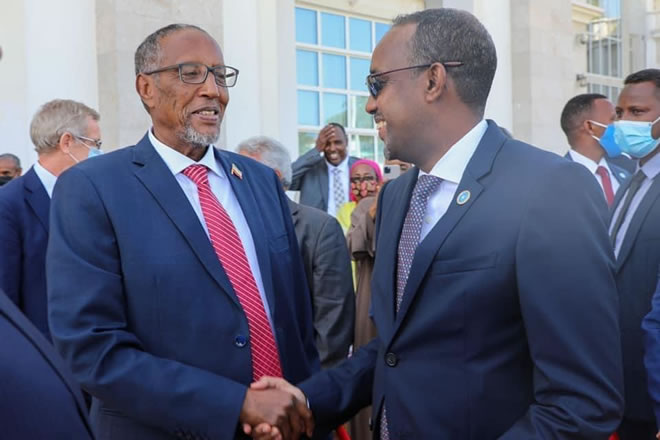
Somaliland president Muse Bihi and Somali Prime Minister Mohamed H. Roble, in a rare encounter at the swearing-in-ceremony of president Ismail Omar Guelleh.
DIJIBOUTI (HOL) – Somali Prime Minister Mohamed Hussein Roble today met with the president of the breakaway region of Somaliland Muse Bihi in a rare encounter signaling a possible path to ease of differences between the two sides which have had frosty relations in recent years.
The two leaders were seen sharing light moments in Djibouti after they attended the swearing-in ceremony of their host President Ismail Omar Guelleh. Somali Ambassador to Djibouti Salaad Ali Jeele appears in the background holding his head drawing mixed reactions from Somalis online.Ads By GoogleThe meeting is the first high profile encounter between the leaders of Somalia and Somaliland after an Ethiopia mediated meeting between President Mohamed Farmaajo and Bihi in 2019 ended in accusations.
Though the encounter between Roble and Bihi may not have been formally planned, it signified a possibility of the two sides softening their stances. PM Roble has earned local and international confidence in recent weeks over his handling of the ongoing electoral stalemate. He is expected to lead a new round of negotiations with opposition groups and the Federal Member States from next week.
Sources have indicated the international community has gradually shifted focus from Farmaajo to Roble who is seen as a moderate and instrumental in helping break the electoral gridlock.
PM Roble also met with President Uhuru Kenyatta barely three days after Kenya suspended flights to and from Somalia.
The Nile Water Issue as Seen from South Sudan
The Nile Water Issue as Seen from South Sudan
Source: The South Sudan News Agency published on 25 April 2021 an analysis titled “Analyzing the Struggle over the Nile River: The Need for a New Legal Flexible Agreement” by Peter Reat Gatkouth.
The author argues that the Nile River basin’s existing legal framework is inadequate to meet the needs of the Nile Basin countries. The focus of the article is on the upstream states and the need for a Nile treaty that provides a fair distribution of water rights. 0 commentsLabels: Atbara, Burundi, DRC, Egypt, Ethiopia, history, international law, Kenya, Rwanda, South Sudan, Sudan, Tanzania, Uganda, White Nile
Sudan: Typical of Africa’s Challenges?
Sudan: Typical of Africa’s Challenges?
Source: The Brenthurst Foundation published in April 2021 a discussion paper titled “Sudan: A Metaphor for Africa?” by Greg Mills.
The author concluded that Sudan will prosper or falter depending on its ability to manage its demography, democracy, and dependency on its neighbors as it faces a yawning gap between its elites and ordinary people. Is this the same challenge facing many other African countries?0 commentsLabels: agriculture, democracy, demography, Egypt, Ethiopia, GERD, governance, history, Nile Basin, oil, Omar al-Bashir, South Sudan, Sudan, terrorism, US
UN Gives $65 Million in Aid to Ethiopia, Tigray
UN Gives $65 Million in Aid to Ethiopia, Tigray



Source: AP, Friday May 7, 2021
A bus carrying displaced people arrives at the Tsehaye primary school, which was turned into a temporary shelter for people displaced by conflict, in the town of Shire, Tigray region, Ethiopia, March 14, 2021
UNITED NATIONS (AP) — The United Nations announced Thursday it has released $65 million for humanitarian aid in Ethiopia, including $40 million for the Tigray region where a military operation launched in November has escalated into a war in which widespread atrocities are reported and thousands have been killed.
The U.N. humanitarian office said the remaining $25 million will fund aid operations in the rest of Ethiopia, including in response to drought in the Somali and Oromia regions. It said funds will be used to treat children with severe acute malnutrition, rehabilitate water systems and supply water to drought-affected communities and to pre-position humanitarian supplies.A“Ethiopian lives and livelihoods are being destroyed by drought, and children are suffering from malnutrition,” U.N. humanitarian chief Mark Lowcock said in a statement. “And six months into the conflict in Tigray, civilians continue to bear the brunt.”
“Women and girls are being targeted with horrific sexual violence, and millions are struggling to access essential services and food, especially in some rural areas that are completely cut off. We need to scale up the humanitarian response now,” Lowcock said.
The humanitarian office known as OCHA said the $40 million for Tigray will fund emergency shelter, clean water, health care, prevention efforts and response to sexual and gender-based violence, and emergency telecommunications to support the humanitarian response.
OCHA said access to those in need in Tigray “remains a challenge” and aid officials are trying to reach inaccessible areas in the southeast.
Last week, OCHA said, a U.N. humanitarian convoy managed to reach Samre town, where it delivered emergency food and nutrition supplies and organized a mobile health clinic in the Samre hospital.
OCHA urged additional funding for humanitarian aid in Tigray and elsewhere in Ethiopia as well as access to all those in need.
Somalia revives ties with Kenya after nearly six-month break
Somalia revives ties with Kenya after nearly six-month break




Source: Reuters, Friday May 7, 2021
By Abdi Sheikh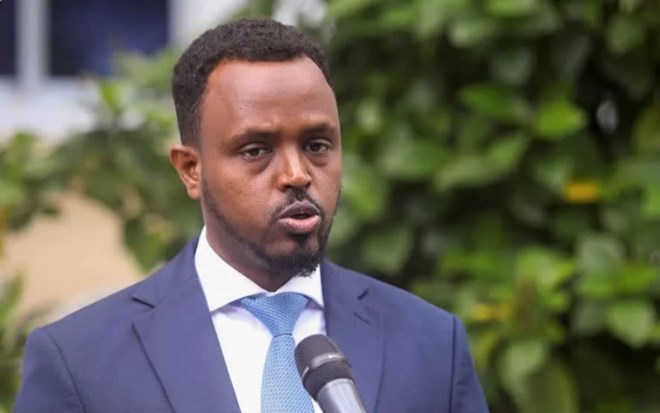
Somali deputy information minister Abdirahman Yusuf speaks during a news conference in Mogadishu
MOGADISHU (Reuters) – Somalia said on Thursday it was restoring diplomatic relations with neighbouring Kenya almost six months after severing ties, accusing Nairobi of meddling in politics.
Relations between the countries have also been tense over the ownership of potential oil and gas deposits, some of which lie off the coast of Jubbaland, one of Somalia’s five semi-autonomous states.”Now diplomatic relations are restored,” deputy information minister Abdirahman Yusuf told a news conference in Mogadishu, saying the Gulf Arab state of Qatar had helped in the process.
Kenya’s foreign ministry said that it took note of the Somali government’s announcement.
The Ministry of Foreign Affairs “looks forward to further normalization of relations by the Somali authorities including with regard to trade, communication, transportation, people-to-people relations and cultural exchanges,” it said in a statement. It also acknowledged the support of Qatar in particular in its efforts to normalize relations.
Qatari Foreign Minister Sheikh Mohammed bin Abdulrahman Al-Thani told Reuters that Doha had agreed with the presidents of both countries that they would work on strengthening bilateral relations and bringing them “back on track”.
The minister said his special envoy for counterterrorism and mediation of conflict resolution, Mutlaq Al-Qahtani, had visited both countries.
“We believe that normalizing the relationship between the two neighbours is very important for political stability, especially in Somalia which is currently going through political turmoil … and we look forward to the elections there,” he said.
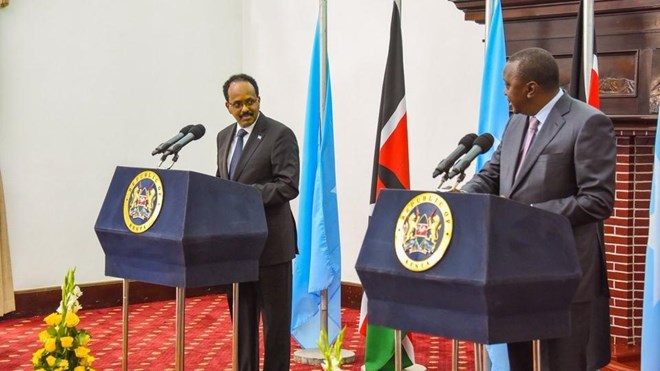
Somali President Mohamed Abdullahi Mohamed has directed the prime minister to prepare a parliamentary election. A delay led to a political crisis that raised fears al Qaeda-linked al Shabaab insurgents could exploit a security vacuum if state forces turn on each other.
State House in Nairobi tweeted that President Uhuru Kenyatta “received a special message” from Qatari Emir Sheikh Tamim Bin Hamad Al-Thani that was delivered by the foreign minister’s special envoy.
In November, Somalia expelled Kenya’s ambassador and recalled its own from Nairobi after accusing Kenya of interfering in the electoral process in Jubbaland.
In February 2019, Kenya recalled its ambassador after Mogadishu decided to auction oil and gas exploration blocks at the centre of their maritime rights dispute. The two countries had revived ties in November the same year.
The two are at present before the World Court to adjudicate the maritime boundary dispute.
(Reporting by Abdi Sheikh; Additional reporting by George Obulutsa and Ghaida Ghantous; Writing by Maggie Fick; editing by Bernadette Baum/Mark Heinrich and Grant McCool)
UK launches road infrastructure project in Somaliland
UK launches road infrastructure project in Somaliland




Source: Hiiraan Online, Tuesday May 4, 2021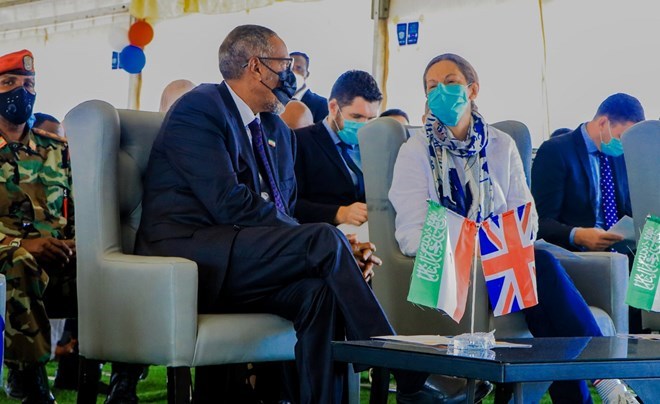
Hargeisa (HOL) – The British government is investing $ 17 million in a 22.5 km road project that will divert trucks from Hargeisa.
Somaliland President Muse Bihi Abdi and British Ambassador to Somalia Kate Foster jointly laid the foundation stone for the project on the eastern outskirts of Hargeisa on Monday.The chairman of the Berbera Corridor, Isse Hamari, said the new road would significantly improve productivity.
“This road is 22.5 km long and runs from the city’s northern outskirts, starting at Haleya (eastern checkpoint in Hargeisa) and ending at Shifo Hospital,” Hamari said.
“This road is part of the Berbera Corridor, it is clearing the city, and 1000 trucks a day are expected to pass instead of the current 30 or 40,” he added.
The road, which is part of the Berbera Corridor, will complete the diversion of trucks from Hargeisa, which they used to pass through.
Ethiopia at the Political Crossroads
Ethiopia at the Political Crossroads
Source: The Associated Press published on 4 May 2021 an article titled “Ethiopia ‘At a Crossroads’ Amid Spiraling Ethnic Conflict” by Rodney Muhumuza.
The author says Ethiopia is at the point where it needs to decide to continue with its system of ethnic federalism or switch to some other form of governance. 0 commentsLabels: Abiy Ahmed, Amhara, atrocities, elections, Eritrea, Ethiopia, ethnic cleansing, ethnic conflict, ethnic federalism, governance, Oromo, Prosperity Party, Tigray Region, Tigrayans, TPLF
What Does Eritrean President’s Visit to Sudan Mean for Ethiopia?
What Does Eritrean President’s Visit to Sudan Mean for Ethiopia?
Source: The Associated Press published an article on 4 May 2021 titled “Eritrea’s President Visits Sudan Amid Tensions over Ethiopia” by Samy Magdy.
Eritrea has had to assure Sudan that it has no role in the border dispute between Ethiopia and Sudan. A Sudan government statement said leaders of the two countries will discuss the border dispute and Ethiopian-Sudanese differences over the Grand Ethiopian Renaissance Dam (GERD).
Comment: As relationships become more complicated in the Horn of Africa because of differences over the GERD, the Sudan-Ethiopia border conflict, and the continuing presence of Eritrean troops in Ethiopia, the visit by Eritrean President Isaias Afwerki to Khartoum takes on added importance and almost certainly raises questions in the minds of Ethiopia’s leaders as to the intentions of Sudan and Eritrea. 0 commentsLabels: Abdel Fattah al-Burhan, border conflict, Chris Coons, debt, Eritrea, Ethiopia, GERD, human rights, Isaias Afwerki, refugees, state sponsor of terrorism, Sudan, Tigray Region, US
US envoy in Egypt for talks on Ethiopia’s dam dispute
US envoy in Egypt for talks on Ethiopia’s dam dispute



Source: AP, Thursday May 6, 2021
U.S. Special Envoy for the Horn of Africa Jeffrey Feltman, left, meets with Egyptian Foreign Minister Sameh Shoukry, third right, and their delegations, at the foreign ministry in Cairo, Egypt, Wednesday, May 5, 2021. (AP Photo/Nariman El-Mofty)
CAIRO (AP) — The U.S. envoy for the Horn of Africa on Wednesday met with the Egyptian president as part of Washington’s new push to find a resolution to a regional decade-long dispute over Ethiopia’s massive dam on the Nile River’s main tributary.
Jeffrey Feltman arrived in Cairo on Tuesday on the first leg of a tour that includes stops in Eritrea, Ethiopia and Sudan amid growing concerns the dispute could escalate into a military conflict, threatening the entire region.
On Wednesday, Feltman met with Egyptian President President Abdel Fattah el-Sissi, who reiterated his warnings that Cairo will not tolerate any moves by Addis Ababa that could reduce Egypt’s share of water from the Nile because of the Grand Ethiopia Renaissance Dam.El-Sissi said Egypt would not accept anyone “harming its water interests” and described the issue of the dam as “existential” to his country, urging the U.S. to play “an effective role” to settle the dispute.
Feltman, who also met with Egypt’s foreign and irrigation ministers, was quoted as saying that the Biden administration is “serious in settling such a sensitive issue.”
The dispute now centers on how quickly Ethiopia should fill and replenish the reservoir and how much water it releases downstream in case of a multi-year drought. The latest round of African Union-brokered negotiations in April failed to make progress.
Egypt and Sudan argue that Ethiopia’s plan to add 13.5 billion cubic meters of water in 2021 to the dam’s reservoir on the Blue Nile is a threat to them. Cairo and Khartoum have called for the U.S., the U.N, and European Union to facilitate reaching a legally binding deal on the dam’s the filling and operating. Ethiopia rejected the call.
In March, el-Sissi warned of regional “instability that no one can imagine” without a legally binding agreement on operating the dam, based on international law and norms governing cross-border rivers.
Egypt, which relies on the Nile for more than 90% of its water supplies, fears a devastating impact if the dam is operated without taking its needs into account. Ethiopia says the $5 billion dam is essential, arguing the vast majority of its population lacks electricity.
Sudan wants Ethiopia to coordinate and share data on the dam’s operation to avoid flooding and protect its own power-generating dams on the Blue Nile, the main tributary of the Nile.
The Blue Nile meets with the White Nile in Khartoum, from where it winds northward through Egypt and flows into the Mediterranean Sea.
In Khartoum, U.S. Sen. Chris Coons, a Democrat from Delaware and chairman of a subcommittee of the Senate Foreign Relations Committee, said the dam dispute needs be negotiated “in good faith” to produce an agreement guaranteeing a “safe and steady flow of the Nile.”
Coons, a key ally of President Joe Biden, spoke on a visit to Sudan with fellow senator Chris Van Hollen of Maryland, chairman of a subcommittee on Africa and global health policy. They discussed with Sudanese leaders the African country’s fragile transition to democracy and another border dispute between Khartoum and Addis Ababa.
Budget Pressures Spur Somalia to Resolve Political Crisis
Budget Pressures Spur Somalia to Resolve Political Crisis




Source: Bloomber, By David MalinghaThursday May 6, 2021

President Mohamed Abdullahi in Mogadishu on May 1. Source: AFP/Getty Images
Somalia will expedite elections in a bid to quell instability and coax donors into releasing funds needed to pay the nation’s security forces and other state employees, Foreign Minister Mohamed Abdirizak said.
The prime minister is scheduled to meet representatives from political parties and other interested groups in July to agree on the voting process, Abdirizak said. The authorities will then announce dates for parliamentary and presidential votes.Ads By Google“It could happen within 90 days” from when they set a date, Abdirizak said in a May 3 interview.
Somalia is proceeding with the elections after President Mohamed Abdullahi reversed a decision to extend his mandate without holding a vote as scheduled in February. The planned delay stoked violence in the Horn of Africa nation, which has been battling an Islamist insurgency for 15 years, and led the U.S. to threaten sanctions.
Somalia is dependent on donor funding, with domestically generated revenue contributing less than half of its annual budget. The government has received less than half of the 100 million euros ($120 million) the EU pledged in a three-year budget-support program that ends this year.
The government has warned there’s a risk of increased unrest if funding gaps leave it unable to cover its wage bill.
“If the government is not able to continue to pay salaries to civil servants, and particularly the security forces, that could create enormous damage,” said Abdirizak. “We are in talks to get those funds released.”
The EU didn’t immediately respond to an email seeking comment.Somalia is struggling to rebuild after two decades of civil war and amid an insurgency by al-Shabaab, an al Qaeda-linked group that the federal government is fighting with the help of neighboring states, the U.S. and the EU. While the group is concentrated in the Middle Shabelle and Lower Shabelle regions, they have recently increased attacks on the capital, Mogadishu.
UN chief welcomes Somali move to return to agreed electoral mode
UN chief welcomes Somali move to return to agreed electoral model




Source. XINHUAnet, Sunday May 2, 2021
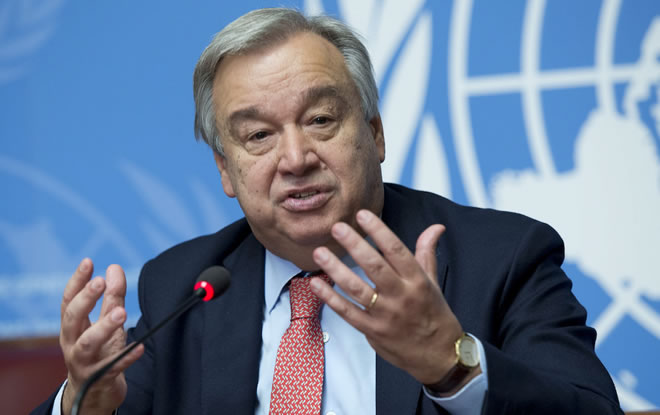
UNITED NATIONS, May 1 (Xinhua) — UN Secretary-General Antonio Guterres on Saturday welcomed the decision of Somalia’s lower house of parliament to nullify the “Special Law on Federal Elections” and return to the modalities outlined in the Sept. 17, 2020, electoral agreement, said his spokesman.
The secretary-general reiterated his call to all Somali stakeholders to resume dialogue immediately and forge a consensual agreement on the holding of inclusive elections without further delay. He stressed the importance of a broad-based consensus for the country’s stability, said Stephane Dujarric, the spokesman, in a statement.5Somalia’s lower house of parliament voted on Saturday to annul the April 12 mandate extension bill, which extended the terms of the executive and legislative arms of the federal government by two years.
President Mohamed Farmajo, who addressed the house before the vote, asked the lawmakers to revert to the Sept. 17, 2020, deal that was agreed between the federal government and five leaders of the federal member states.
He said the Sept. 17 deal was unanimously supported by the national consultative forum in order to save the country from political instability and to urgently head to commonly agreed elections.
The April 12 bill plunged Somalia into a political crisis that later erupted into fighting on Tuesday between government forces and those backing the opposition.
Somalia’s parliament votes to cancel presidential term extension
Somalia’s parliament votes to cancel presidential term extension



Source: Reuters, Sunday May 2, 2021
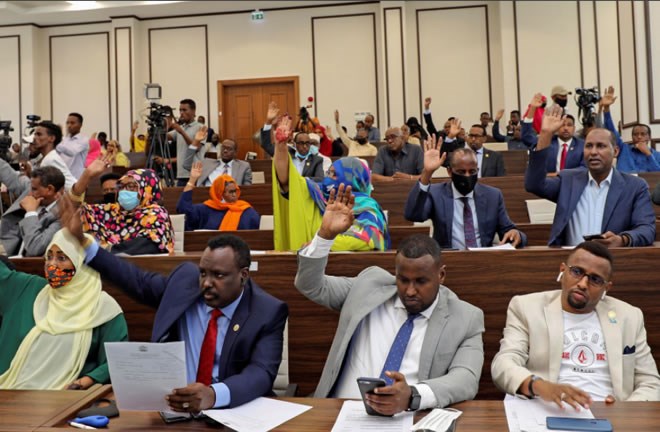
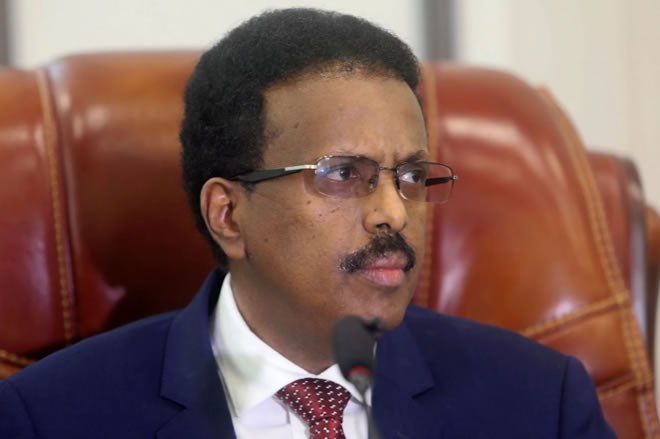
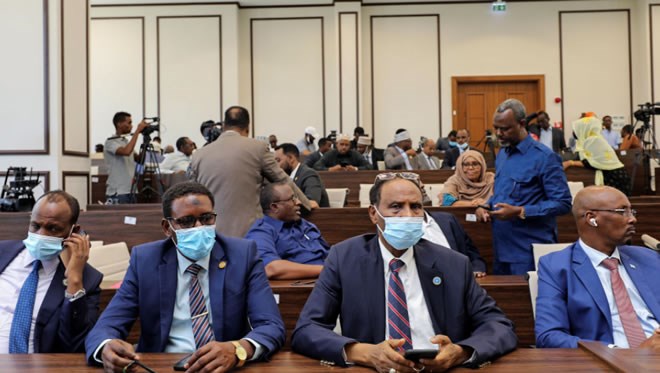
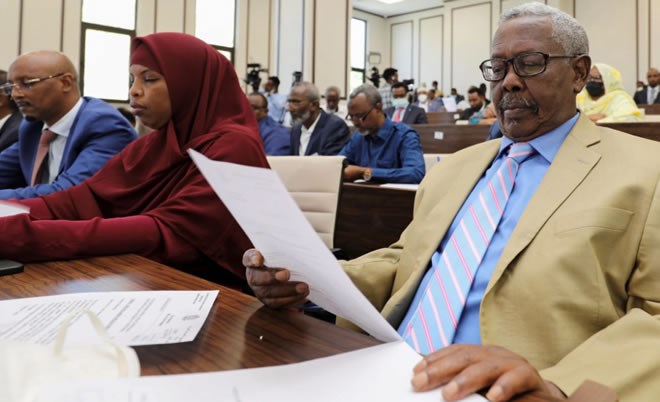

Somalia legislators vote by rising their hands to cancel a divisive two-year presidential term extension, inside the lower house of Parliament in Mogadishu, Somalia May 1, 2021. REUTERS/Feisal Omar
Somali lawmakers voted unanimously on Saturday to cancel a two-year presidential term extension they had approved last month, after clashes in the capital Mogadishu between factions of the security forces, which are divided over the issue.
In a speech following the vote in the lower house of parliament, Prime Minister Mohamed Hussein Roble ordered the army to return to barracks and urged politicians to avoid inciting violence.
The political crisis has raised fears that al Qaeda-linked al Shabaab insurgents could exploit a security vacuum if state forces split along clan lines and turn on each other. The group has taken over at least one Somali town in the past week as heavily armed fighters moved from the countryside into the capital city.
President Mohamed Abdullahi Mohamed’s attempt to extend his term has also angered foreign donors, who have backed his government in an attempt to bring stability to Somalia after more than two decades as a failed state following a civil war that began in 1991.
Saturday’s lower house vote was broadcast on Somali television and came shortly after Mohamed addressed parliament and said he was directing the prime minister to prepare to hold a delayed parliamentary election.
Roble said in a Twitter post late on Saturday that the government will “soon” prepare the plan for elections, and thanked the president and the parliament.
Mohamed’s term expired in February, but without a new crop of lawmakers, parliament was unable to choose a president.
The term extension was approved by the lower house last month but rejected by the Senate, provoking the crisis that has intensified in the past week.
Between 60,000 and 100,000 people were forced to flee their homes following clashes on Sunday that stirred fears of all-out war between heavily armed factions for and against the president.
Rashid Abdi, a Nairobi-based independent analyst, said the parliamentary vote and the president’s move towards holding elections appeared to be a good compromise.
“The problem is there is so little trust between the parties and as long as Farmaajo holds the levers of the military and security services, it looks difficult to build confidence in that process,” he said, using a popular nickname for the president.
The U.S. State Department, the EU ambassador, and the Turkish foreign ministry praised Saturday’s developments.
“We call on the parties to the agreement to meet immediately without preconditions to finalize electoral arrangements and begin implementation in a collaborative and transparent manner,” State Department spokesman Ned Price said in a statement, adding that the United States stood ready to support the conduct of elections as soon as possible.
BATTLE LINES DRAWN
Opposition lawmaker Abdirahman Odowaa told Reuters “much remains to be done”, adding that he wanted Mohamed to formalise what had been agreed.
“The handing over of security and election process to the prime minister should be documented and signed … (He) has to go to the conference tent and sign … before all,” Odowaa said.
Senator Ilyas Ali Hassan, from another opposition party, Himilo Qaran, said he hoped Roble “will now lead the election and … do the right thing, so that this country can have a free and fair election”.
Abdulahi Ali Hirsi Timaade, information minister of Puntland, one of Somalia’s five regional governments, told Reuters he wanted Mohamed to confirm in a letter that he had given Roble responsibility for the elections and security.
Mogadishu shopkeeper Duale Hussein said he feared the opposition had been duped.
“He cleverly did a somersault,” Hussein said of the president. “Farmaajo still rules everything … Roble is just his remote control.”
It was not immediately clear whether security forces loyal to the opposition would withdraw from fortified positions in the capital following Saturday’s vote and Roble’s order, having refused to do so earlier this week. read more
Somalia’s armed forces include members of clan militias who have often battled each other for power and resources.
Mohamed is Darod, one of Somalia’s major clans. Most of the opposition leaders and Somali military in the capital are Hawiye, another large clan.
U.S. urges Somali parliament to annul term extension
U.S. urges Somali parliament to annul term extension




Source: Hiiraan Online, Thursday April 29, 2021
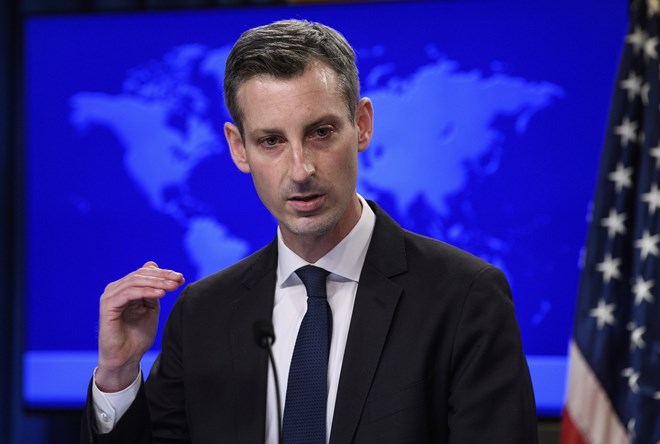
U.S. State Department spokesperson Ned Price speaks during a press briefing in Washington, D.C., the U.S., Feb. 2, 2021. (AP Photo)
WASHINGTON (HOL) – The US has called on Somali parliament and president Mohamed Farmaajo to annul the April 12, 2021 resolution by the Lower House, which granted the Farmaajo two more years in office.Ads By GoogleState Department spokesperson Ned Price said in a statement on Thursday that the Biden administration welcomed Farmajo’s announcement to accept a return to talks but noted parliament must revoke its own controversial decision that the 275-member chamber voted to pass on April 12.
“The United States notes President Farmaajo’s April 28 commitment to return to the September 17 election agreement and resume talks immediately with Federal Member State leaders,” Price said. “We call on the President and Parliament to act swiftly to annul the April 12 mandate extension bill.”
The statement follows Farmaajo’s national address Tuesday to rescind his extension stance.
“I have decided to appear before the members of the House of the People of the Federal Parliament on Saturday to gain their endorsement for the electoral process that as agreed upon between the Federal Government, the Heads of the Federal Member States and the Governor of BRA,” Farmaajo said.
He also called on the Federal Member States to return for talks based on the September 17 agreement. However, Puntland has already rejected the call for a sit-down with Farmaajo.
Along with several international partners, the US had heavily criticized Farmajo’s government for extending its mandate and publicly warned that it would be forced to reassess its bilateral relationship with Somalia if it did not rescind the extension. Following a breakout of violence in the capital on Sunday, Ned Price said the United States was “gravely concerned” and said it would consider ‘all available tools’ – including sanctions and visa restrictions – to respond to political spoilers.
US warns citizens against travel to Somalia over outbreak of violence
US warns citizens against travel to Somalia over outbreak of violence




Source: Hiiraan Online, Monday April 26, 2021
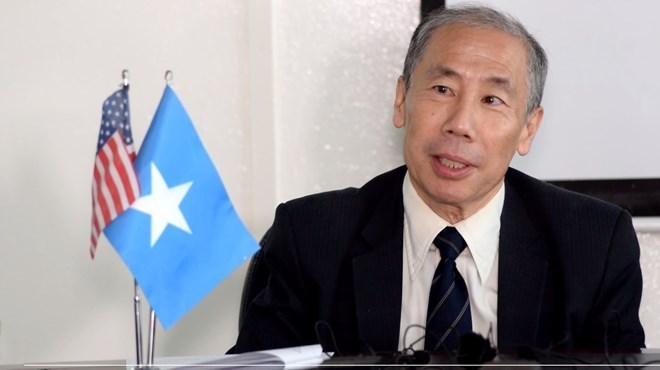
MOGADISHU (HOL) – The US Government has warned its citizens against traveling to Somalia following the outbreak of violence and the ongoing security risks in the country.
The state department said in its latest travel advisory Somalia remained a dangerous place for its citizens warning against travel to the Horn of Africa nation.
It cited the violence which broke out on Sunday between government forces and militias allied to the opposition.
The US Government also noted improvised explosive devices (IED) attacks have risen significantly in Mogadishu since the beginning of the year compared to last year.
“The security situation has deteriorated in the last few months. March saw the highest number of improvised explosive device (IED) attacks in Mogadishu since September 2019,” the advisory read in part. “ Mogadishu has experienced one suicide vehicle-borne IED each month in 2021 compared to six for the entirety of 2020.”
An ongoing political impasse in Somalia led to a significant outbreak of violence in Mogadishu between government and opposition-affiliated forces on April 25, 2021, the US Government added noting the fighting involved the use of heavy weapons including explosives.
Calm returned in Mogadishu Monday following deadly clashes between government forces and opposition militias Sunday.
The militias held control of districts in northern Mogadishu and Daynile district amid fears of resumption of violence.
The UN, regional bloc IGAD and the UK among foreign and local voices warned against the escalation of violence and called for restraint among parties to the violence.
The planet’s on ‘red alert’ UN chief warns leaders at President Biden’s climate summit
The planet’s on ‘red alert’ UN chief warns leaders at President Biden’s climate summit

Source: NOAA/Jerry PenryScientists believe that climate change is causing an increase in extreme weather events. 22 April 2021Climate and Environment
World leaders must act now and put the planet on a green path because “we are at the verge of the abyss”, UN Secretary-General António Guterres said on Thursday in his address to the virtual climate summit convened by United States President Joseph Biden.
“Mother Nature is not waiting”, the UN chief warned, as the past decade was the hottest on record, and the world continues to see rising sea-levels, scorching temperatures, devastating tropical cyclones and epic wildfires.
“We need a green planet — but the world is on red alert,” he said. “We are at the verge of the abyss. We must make sure the next step is in the right direction. Leaders everywhere must take action.”
US commitment and investment
The Secretary-General thanked President Biden for hosting the two-day Leaders Summit on Climate, and applauded US commitment to cut greenhouse gas emissions.
In his introductory remarks, President Biden announced the country would slash emissions in half, by 2030. He spoke of the “extraordinary job creation and economic opportunity” that climate response provides, proposing investments in sectors such as energy, transportation, construction and farming.
President Biden acknowledged that no nation can solve the climate emergency alone, and he called for leaders of the world’s largest economies to “step up” in the race to a sustainable future.
“Scientists tell us that this is the decisive decade. This is the decade we must make decisions that will avoid the worst consequences of the climate crisis,” he said.
Net-zero coalition
Mr. Guterres used the Summit to amplify his call for a global coalition to achieve net-zero carbon emissions by 2050, and for countries to ramp up their commitments under the landmark Paris Agreement on climate change.
The 2015 treaty aims to limit global temperature rise to below 1.5 degrees Celsius above pre-industrial levels, and requires governments to commit to increasingly ambitious climate action through plans known as Nationally Determined Contributions (NDCs).  UN Photo/Evan SchneiderSecretary-General António Guterres addresses the Leaders Summit on Climate hosted by US President Joe Biden.
UN Photo/Evan SchneiderSecretary-General António Guterres addresses the Leaders Summit on Climate hosted by US President Joe Biden.
“All countries – starting with major emitters – should submit new and more ambitious Nationally Determined Contributions for mitigation, adaptation and finance, laying out actions and policies for the next 10 years aligned with a 2050 net-zero pathway”, he said.
These commitments also must be translated into “concrete, immediate action”, he added, as it is estimated that less than a quarter of pandemic recovery spending will go towards mitigating emissions, reducing air pollution or strengthening natural capital.
Borrowing from the future
“The trillions of dollars needed for COVID-19 recovery is money we are borrowing from future generations. We cannot use these resources to lock in policies that burden them with a mountain of debt on a broken planet.”
The UN chief appealed for leaders to “put a price on carbon” through taxation. He called for ending subsidies for fossil fuels and instead, ramping up investment in renewable energy and green infrastructure.
“Stop the financing of coal and the building of new coal power plants. Phase out coal by 2030 in the wealthiest countries, and by 2040 everywhere else. Ensure a just transition for affected people and communities”, he said.
Step up financing
Building the global net zero coalition will require a breakthrough in both finance and adaption, the Secretary-General said. He urged donors, as well as banks, to move from 20 to 50 per cent in all climate finance flows to resilience and adaptation.
“Before the United Nations climate conference in November in Glasgow, we need concrete proposals that ease access to greater finance and technological support for the most vulnerable countries,” he added.
“Developed States must deliver on public climate finance, including the long-promised US $100 billion for climate action in developing countries, at the G7 Summit in June.”
Growing danger
The head of the UN climate convention body (UNFCCC) Patricia Espinosa, issued a statement on the Summit, noting that the global climate change emergency was “a clear, present and growing danger to all people on this planet.
“It recognizes no borders and while nations may be impacted differently, none are immune”, she said. “This is a time for leadership, courage and solidarity by global leaders; a time they must make the tough decisions necessary to finally fulfill the promises of the Paris Agreement and move the world away from disaster and towards an unprecedented era of growth, prosperity and hope for all.
Sudan threatens legal action if Ethiopia dam filled without deal
Sudan threatens legal action if Ethiopia dam filled without deal




Source: Aljazeera, Saturday April 24, 2021
Sudanese Irrigation Minister Yasser Abbas says Ethiopia rejected invitation to three-way summit to discuss stalled negotiations over GERD.
![Ethiopia has said it planned to complete the second phase of filling the dam during the upcoming rainy season [File: Eduardo Soteras/AFP]](https://www.aljazeera.com/wp-content/uploads/2020/07/ce74384006524b04ab8a777288a4ca68_18.jpeg?resize=770%2C513)
Ethiopia has said it planned to complete the second phase of filling the dam during the upcoming rainy season [File: Eduardo Soteras/AFP]
A Sudanese minister has warned that his country could take legal action against Ethiopia if the latter goes ahead with plans to fill a mega-dam on the Blue Nile without first reaching a deal with Khartoum and Cairo.
In a series of Twitter posts on Friday, Sudan’s Irrigation Minister Yasser Abbas also said Ethiopia had “objected” to an invitation for a three-way summit to discuss stalled negotiations over the Grand Ethiopian Renaissance Dam (GERD).
Ethiopia, Egypt, Sudan and Ethiopia have been locked in inconclusive talks for nearly a decade over the filling and operation of the massive dam, which broke ground in 2011.Ads By GoogleThe Ethiopian government says GERD is crucial for economic development and power generation, but Egypt fears it will imperil its water supply. Sudan is also concerned about the effect on its own water flows.
Ethiopia has said it planned to complete the second phase of filling the dam during the upcoming rainy season, a move Sudan and Egypt rejected before a binding legal agreement was reached.
If Ethiopia goes ahead with the filling, Sudan “would file lawsuits against the Italian company constructing the dam and the Ethiopian government”, Abbas warned.
He said the lawsuits would highlight that the “environmental and social impact as well as the dangers of the dam” have not been taken into adequate consideration.
“Given that the environmental and social impacts and accompanying risks of the GERD have not been studied, various options are being considered, including The International Court of Justice, The Human Rights Commissions and the COMESA Court.”
There was no immediate reaction by the Ethiopian government.
Talks in Kinshasa overseen by the African Union (AU) collapsed earlier this month, after which Sudanese Prime Minister Abdalla Hamdok invited the leaders of Ethiopia and Egypt to Khartoum. He had given them until Friday to attend.
Meanwhile, Abbas said that while previous negotiations between the three countries had yielded agreement over 90 percent of outstanding issues, that progress was now in doubt.“The AU did not perform its leadership role,” Abbas wrote on Twitter. “They were only observers, and we see that there was no serious methodology for reaching an agreement,” he said, adding that nine months “have been wasted in futile negotiations, and we will not accept waste any more time.”
Sudan and Egypt had proposed including the European Union, the United States and the United Nations as mediators in the dispute in addition to the continuing AU facilitation of the talks. Both countries said Ethiopia had rejected the proposal.
Ethiopian Water Minister Seleshi Bekele told Reuters news agency that Addis Ababa did not believe negotiations between the three countries were finished or had failed, and added that the appropriate next step would be for the heads of states to meet under the auspices of the AU.
Tension over the dam comes as Sudan’s relations with Egypt warm while its relations with Ethiopia have been hit by a dispute over the use of the al-Fashaga farmland near their common border.
In March, Sudan said it has accepted an offer by the United Arab Emirates to mediate with Ethiopia over GERD and the contested border region.
Abbas said the UAE’s initiative included investment opportunities in the al-Fashaga region as well as an “unofficial bid to bridge the gap in views with regard to GERD”.

